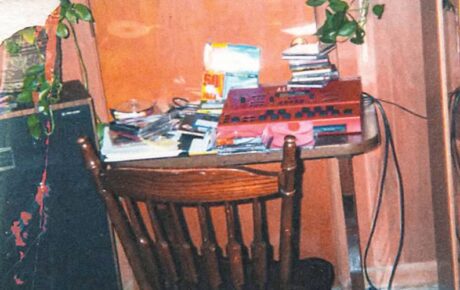A posthumous release from one of the world’s most recognisable vocalists is a welcome addition to an already expansive legacy. Songwriter is an aptly titled new album from Johnny Cash, as it celebrates his ultimate contribution to the music world – his ability to write songs.
The album has finally been pulled together after old recordings from 1993 of just Johnny and his acoustic guitar were rediscovered by his son 30 years later. Johnny Cash recorded these songs during a gap in contracts in the early nineties, at LSI studios in Nashville, which was owned by his son in-law Mike Daniels and daughter Rosey. It seemed the lack of obligation to anyone enabled Cash to finally lay down these songs, some of which had been worked on over numerous years.
After distilling the original recordings to Johnny’s vocals and guitar, John Carter enlisted Fergie Ferguson, a longtime friend and Johnny’s trusted engineer for nearly three decades. Together, they crafted an album that honours Johnny’s songwriting and timeless voice, remaining faithful to the spirit of the original recordings. Fergie, having worked closely with Johnny since the early 1980s at Cowboy Jack Clement’s studio, understands Johnny’s recording preferences intimately, collaborating on numerous albums, including Johnny’s acclaimed American Recordings series with Rick Rubin, extending to Johnny’s final recordings in 2003.
A pack of versed musicians were selected to come together at Cash Cabin in Hendersonville, Tennessee, and complete the ensemble. One band member was another past soul, Dave Roe. Dave’s upright bass throughout the album is stoic and trad, sounding even more poignant with him performing next to our beloved Johnny Cash. Roe had a hard time for not being quite good enough back in the day, famously being given money by Johnny to take extra lessons on the instrument, so for him this was an opportunity to lay all his gained skills to bare.
View this post on Instagram
Another indispensable choice for the band included Marty Stuart on guitar, having joined Johnny Cash in The Tennessee Three from 1980 to 1986, his knowledge and capability was well matched. Having key contributors who had historically played with Cash in the good ol days, meant the chemistry among the band was palpable, even without Johnny physically present in the room. Roe & Stuart have said they played as if Johnny was in the room, setting themselves certain expectations for their performance that would have aligned with the way Johnny worked.
The album also features other Nashville luminaries such as Ana Cristina Cash, Matt Combs, Mike Rojas, Russ Pahl, and Sam Bacco, who contributed to the core band, while Kerry Marx and Harry Stinson made guest appearances. The pedigree of performers making up this record is undeniable, and that Nashville flare is nothing short of steadfast in this album.
The tracks that are presented throughout the album reinforce this wonderful back story of musicianship and craft. It starts off with the universally minded ‘Hello Out There’, which features commentary of the state of the world from Johnny’s humble perspective. We hear him facilitate his own ambient echo on lines “Hello out there / This is planet earth / Calling calling calling”. Johnny continues to assess how things are on our planet, and muses about the systemic issues we all face, “Our net worth is falling / Falling falling falling”. It is a track that makes you stop and think, and the ambient setting is an appropriate backdrop, with steel guitar from Stuart taking the track to a spacey height. Overall, it ends on a hopeful note, and Johnny’s voice makes this hope feel completely sensible.
‘Spotlight’ is a heady number with string blemishes and a grounded beat. It approaches this nice relaxed bluesy tone, facilitated by the Black Keys’ Dan Auerbach. Dan’s solo is sincere and smooth, he is a welcome addition to the guest appearances on this LP. The album does a very good job at modernising Johnny Cashes sound, to reintroduce it to a younger audience. A song like ‘Spotlight’ is a fitting choice for this purpose.
‘Drive On’ is quite the hazy listen, with its brush strokes on the drums, and the wavering guitar lead. The song is about acknowledging the pains and perhaps the trauma we live with, but equally the ability to overcome. It was written when Johnny himself was overcoming a jaw injury while contrasting his own personal experience with the aftermath of the Vietnam war.
‘I Love You Tonite’ is an ode to Johnny’s love, June Carter Cash. Many of the songs from this album held personal significance as a result of sentiments such as this one. “But your people, have always been my people” and “I love you tonite / even more than I did in the sixties” are both such sincere musing on the longevity of his love. Johnny continues to reference the different decades that the love transcended, including chuckling before remarking “Can you believe we made it through the eighties”. A genuine song that encapsulates a love so strong with such simplicity. The song also features Johnny’s close friend and outlaw country legend, Waylon Jennings, and appears again on ‘Like A Soldier.’
‘Have You Ever Been To Little Rock?’, seems to lean right into Americana, and re-issue its roots. It’s a breezy number, with slide guitar and banjo adding silvery tones to make it feel all the more lighter. It takes on a more traditional melody, which is certainly welcome by any Cash fan. Lines like “You can see god’s country / Put a smile on your face” take you to where Johnny is singing about, resulting in a visually inspiring listen.
‘Well Alright’ is another great addition to the lineup, adopting a more 50s rhythm from Johnny’s early days, it’s a simple yet unlikely sentiment about love found in a laundromat. The title is merged into the story seamlessly, it’s almost comical how easy to sing-along it is, “Then I opened up the dryer and I set it on soft and light. She said, “Be gentle with my silk and lace,” and I said, “Well, alright””. Johnny’s little adlibs at the end are a nice touch in this number, again making it feel pretty authentic and carefree. These moments are pure, and they add such colour to the tracks. A great single indeed.
James Taylor is then explicitly mentioned in ‘She Sang Sweet Baby James’, a nice nod to an artist Johnny himself loved. It’s a soft country ballad which tells a story about a woman singing Taylor’s ‘Sweet Baby James’ to her young one. It’s a pretty song that can’t be missed. Full of warm tones and a humble sentiment, this one feels comforting with lyrics like “She was lonely at night when the babe was asleep / But when singin’, it wasn’t so bad”. It completely acknowledges the ability for music to create resolve and perhaps an ailment to everyday life.
‘Poor Valley Girl’ is a tender recall of Johnny’s wife’s mother, Maybelle, who sadly past just before this song was originally written in 1978. The song essentially chronicles June’s childhood and how Maybelle raised her, it’s a song of gratitude for them both. This song is presented neatly, making sure to tell the story succinctly, yet effectively – one of Cash’s best talents.
‘Solider Boy’ is a slower burn, with plump guitar bass notes siting proudly for the rest of the song to ring from. This one feels like Johnny is completely relaxed, his voice sounding youthful, albeit recorded in 1993. Perhaps that is what most special about this record, it breathes a new life for Cash, he sounds renewed and refreshed. Thanks to the recording of his voice and guitar, it’s a carefree experience.
‘Like A Soldier’ is a nice number to round out the album, reflecting on Johnny’s struggle with addiction and his journey overcoming it. This track was reimagined for Johnny’s inaugural American Recordings album in 1994, making this original recording particularly significant. We can hear he has made peace with it; a resilient sounding Cash leads us to redemption. The song almost reflects Johnny’s entire persona in just shy of 3 minutes. A brighter sounding electric guitar raises this one up, striking a modern country sound, representing the legend’s evolution and ability to remain relevant.
For John Carter, curating Johnny’s musical legacy is both a personal journey of healing and a means of connecting with his father. And for the audience, it’s an opportunity to revisit a man with much heritage, and a clear legacy. Storytelling at some of its finest, the album seems to encapsulate everything Johnny Cash sung about, from love, to homeland, hardship, and humour, and it is a joy to get amongst.












